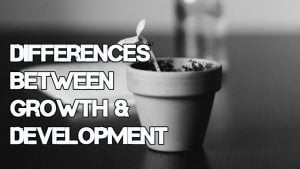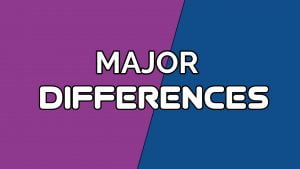“Growth” and “development” are two terms which are synonymous but not conterminous, in that they are similar to each other, but can’t be used interchangeably in place of one another due to their different meaning.
While many assume Growth and Development to be the same as they both follow certain patterns and rules, there is a significant difference which exists between them. This article examines the meaning of these two terms Growth and Development, highlighting these significant differences which exist between them.

Recommended: Differences between standard of living and cost of living
Meaning of Growth
Growth is a permanent and irreversible increase in the size of an organ or individual cell. That is to say that Growth involves the development of a person in age, height, weight, structure, et cetera.
In Psychology, growth is a quantitative physical change which occurs in life. The rate of growth is usually faster until one attains maturity, after which growth is gradual and slows down. An example of growth is the increase in the height and weight of an infant till the point of maturation.
Recommended: Meaning and Functions of the Arms of government
Meaning of Development
While growth involves the increase in size or physical features, the entire process and phenomena whereby a person grows physically, physiologically and evolves to attain mental growth and maturity is collectively referred to as Development. According to Wiktionary, the term was first used in 1756 and was derived from the French développement.
Development is the growth process wherein a person develops in relation to physical, social, and environmental factors. According to psychologists, Development is the physical, cognitive and psychosocial development of humans throughout their life span. An example of development is the changes in behavioural pattern, maturation, thinking, and adaption of a person to his or her environment.
It seems as though the aforementioned definition of Growth and Development does not do justice to the difference which exist between them. For clarity, let’s therefore consider the differences between Growth and Development.
Recommended: Meaning and Differences Between developed and developing countries
Key Differences between growth and development

1) Growth refers to physical changes in living things, while Development refers to the overall changes in living things.
2) Growth is quantitative, while Development is qualitative. That’s to say that Growth is associated with measurable changes such as height and weight. While Development is associated with non-measurable changes such as increase in IQ, changes in behavioural pattern, amongst others.
3) Growth is structural whereas Development is functional. This means that in Growth, we see some changes in the structure of the organism due to growth, while in Development; we do not notice any visible changes in an organism due to development.
4) Growth is limited to certain level. For example, there is a point wherein an individual’s height stops increasing. Development on the other hand is continuous as everyday a person is developing in terms of his or her habits, maturity level, IQ, et cetera. Thus, while Growth takes place within a limited scope of time, Development takes place within a vast scope of time.
5) Growth depends on cellular changes while Development is dependent on organizational growth. For example, a Child could develop habits and pattern of behavior from his organizational growth in his environment.
Also see: Salary of doctors in the United States of America 2021
6) Culture and Environment plays a major role in Development whereas it plays no role in Growth, as Growth depends on hereditary and nutritional factors.
7) Growth is a physical growth which can be noticed on an individual from one stage to another, while Development on the other hand, is considered a gradual change in skill set, habits, and behavior of an individual.
8) Growth is an external process; while Development is an internal process as unlike growth, Development is not visible by the naked eyes instead it requires comprehensive evaluation of your Child’s reasoning, creativity, and innovation so as to ascertain their development.
9) Growth focuses on one aspect while Development focuses on various aspects such as inter-personal skills, intelligence, et cetera.
10) Growth is influenced by Development, while Development is not dependent on growth, and as such occurs without growth.
11) Growth involves body changes, while Development involves changes from origin to maturity.
12) Growth involves the increase in Size and structure, while Development encompasses overall changes including growth and other progressive changes.
13) Development dictates changes in the character of an individual, while Growth may only dictate changes in the physical appearance of an individual.
14) Growth is associated with progressive physical change from one stage to another, while Development on the other hand is associated with the gradual transformation of behavioural and skill-set changes.
Recommended: 11 Differences Between Job and Career
15. Illnesses and diseases can have an impact on growth, whereas traumatic events and life experiences might have an impact on development. Traumatic events and life experiences can have a variety of effects on development. Abuse, neglect, violence, and natural disasters can all result in emotional and psychological discomfort, resulting in changes in behavior, personality, and social relationships.

Life events like as parental divorce, migration, or school transfers can also have an impact on development by altering established routines, connections, and support networks. These events can lead to stress and anxiety, which can have an impact on the development of coping strategies and resilience. Growth, on the other hand, is not or cannot be directly influenced by these circumstances.
16. Development is more subjective, whereas growth is more objective. When it comes to quantifying changes in numbers or physical traits, analyzing growth is frequently more clear and objective. For example, measuring a child’s height or weight over time provides a real and objective manner of following their development. Development, on the other hand, is more subjective since it contains more abstract changes that are difficult to quantify.

Assessing a child’s language development, for example, entails evaluating their communication skills, ability to understand and follow directions, and ability to articulate their thoughts and ideas. These components of development are more difficult to quantify than physical growth. Furthermore, growth encompasses psychological and social components that are even more subjective. For example, a child’s emotional development includes their capacity to control their emotions, create connections with others, and develop a sense of self. These are subjective processes impacted by cultural and individual influences.
Recommended: How to answer law problem questions using IRAC Method
In conclusion, it is understandable to use the term Growth and Development interchangeably, but I trust after reading this article, you now understand the difference which exist between Growth and Development, the fact they don’t have the same meaning and therefore shouldn’t be used interchangeably next time.

Edeh Samuel Chukwuemeka, ACMC, is a lawyer and a certified mediator/conciliator in Nigeria. He is also a developer with knowledge in various programming languages. Samuel is determined to leverage his skills in technology, SEO, and legal practice to revolutionize the legal profession worldwide by creating web and mobile applications that simplify legal research. Sam is also passionate about educating and providing valuable information to people.